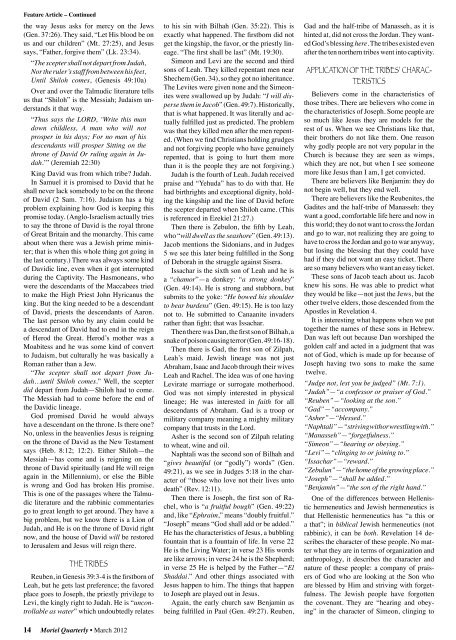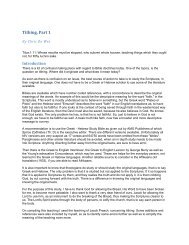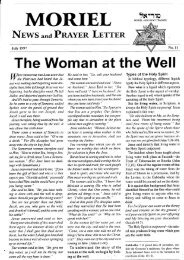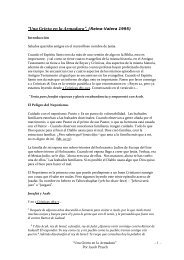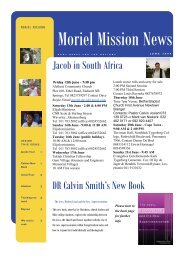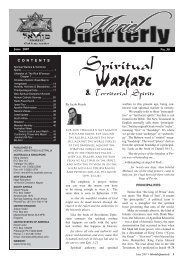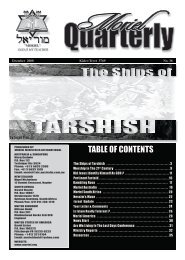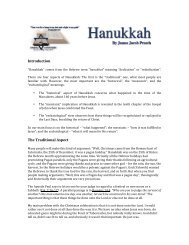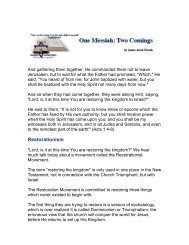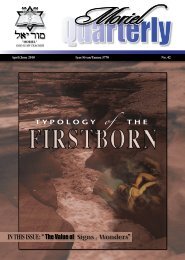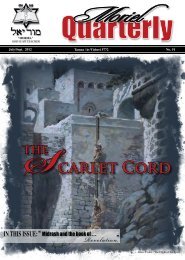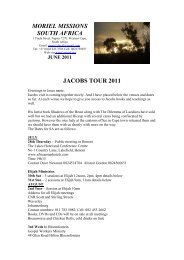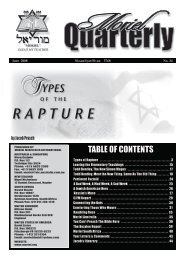The Legacy of Jacob - Moriel Ministries
The Legacy of Jacob - Moriel Ministries
The Legacy of Jacob - Moriel Ministries
You also want an ePaper? Increase the reach of your titles
YUMPU automatically turns print PDFs into web optimized ePapers that Google loves.
Feature Article – Continued<br />
the way Jesus asks for mercy on the Jews<br />
(Gen. 37:26). <strong>The</strong>y said, “Let His blood be on<br />
us and our children” (Mt. 27:25), and Jesus<br />
says, “Father, forgive them” (Lk. 23:34).<br />
“<strong>The</strong> scepter shall not depart from Judah,<br />
Nor the ruler’s staff from between his feet,<br />
Until Shiloh comes, (Genesis 49:10a)<br />
Over and over the Talmudic literature tells<br />
us that “Shiloh” is the Messiah; Judaism understands<br />
it that way.<br />
“Thus says the LORD, ‘Write this man<br />
down childless, A man who will not<br />
prosper in his days; For no man <strong>of</strong> his<br />
descendants will prosper Sitting on the<br />
throne <strong>of</strong> David Or ruling again in Judah.’”<br />
(Jeremiah 22:30)<br />
King David was from which tribe Judah.<br />
In Samuel it is promised to David that he<br />
shall never lack somebody to be on the throne<br />
<strong>of</strong> David (2 Sam. 7:16). Judaism has a big<br />
problem explaining how God is keeping this<br />
promise today. (Anglo-Israelism actually tries<br />
to say the throne <strong>of</strong> David is the royal throne<br />
<strong>of</strong> Great Britain and the monarchy. This came<br />
about when there was a Jewish prime minister;<br />
that is when this whole thing got going in<br />
the last century.) <strong>The</strong>re was always some kind<br />
<strong>of</strong> Davidic line, even when it got interrupted<br />
during the Captivity. <strong>The</strong> Hasmoneans, who<br />
were the descendants <strong>of</strong> the Maccabees tried<br />
to make the High Priest John Hyricanus the<br />
king. But the king needed to be a descendant<br />
<strong>of</strong> David, priests the descendants <strong>of</strong> Aaron.<br />
<strong>The</strong> last person who by any claim could be<br />
a descendant <strong>of</strong> David had to end in the reign<br />
<strong>of</strong> Herod the Great. Herod’s mother was a<br />
Moabitess and he was some kind <strong>of</strong> convert<br />
to Judaism, but culturally he was basically a<br />
Roman rather than a Jew.<br />
“<strong>The</strong> scepter shall not depart from Judah…until<br />
Shiloh comes.” Well, the scepter<br />
did depart from Judah—Shiloh had to come.<br />
<strong>The</strong> Messiah had to come before the end <strong>of</strong><br />
the Davidic lineage.<br />
God promised David he would always<br />
have a descendant on the throne. Is there one<br />
No, unless in the heavenlies Jesus is reigning<br />
on the throne <strong>of</strong> David as the New Testament<br />
says (Heb. 8:12; 12:2). Either Shiloh—the<br />
Messiah—has come and is reigning on the<br />
throne <strong>of</strong> David spiritually (and He will reign<br />
again in the Millennium), or else the Bible<br />
is wrong and God has broken His promise.<br />
This is one <strong>of</strong> the passages where the Talmudic<br />
literature and the rabbinic commentaries<br />
go to great length to get around. <strong>The</strong>y have a<br />
big problem, but we know there is a Lion <strong>of</strong><br />
Judah, and He is on the throne <strong>of</strong> David right<br />
now, and the house <strong>of</strong> David will be restored<br />
to Jerusalem and Jesus will reign there.<br />
<strong>The</strong> Tribes<br />
Reuben, in Genesis 39:3-4 is the firstborn <strong>of</strong><br />
Leah, but he gets last preference; the favored<br />
place goes to Joseph, the priestly privilege to<br />
Levi, the kingly right to Judah. He is “uncontrollable<br />
as water” which undoubtedly relates<br />
to his sin with Bilhah (Gen. 35:22). This is<br />
exactly what happened. <strong>The</strong> firstborn did not<br />
get the kingship, the favor, or the priestly lineage.<br />
“<strong>The</strong> first shall be last” (Mt. 19:30).<br />
Simeon and Levi are the second and third<br />
sons <strong>of</strong> Leah. <strong>The</strong>y killed repentant men near<br />
Shechem (Gen. 34), so they got no inheritance.<br />
<strong>The</strong> Levites were given none and the Simeonites<br />
were swallowed up by Judah: “I will disperse<br />
them in <strong>Jacob</strong>” (Gen. 49:7). Historically,<br />
that is what happened. It was literally and actually<br />
fulfilled just as predicted. <strong>The</strong> problem<br />
was that they killed men after the men repented.<br />
(When we find Christians holding grudges<br />
and not forgiving people who have genuinely<br />
repented, that is going to hurt them more<br />
than it is the people they are not forgiving.)<br />
Judah is the fourth <strong>of</strong> Leah. Judah received<br />
praise and “Yehuda” has to do with that. He<br />
had birthrights and exceptional dignity, holding<br />
the kingship and the line <strong>of</strong> David before<br />
the scepter departed when Shiloh came. (This<br />
is referenced in Ezekiel 21:27.)<br />
<strong>The</strong>n there is Zebulon, the fifth by Leah,<br />
who “will dwell as the seashore” (Gen. 49:13).<br />
<strong>Jacob</strong> mentions the Sidonians, and in Judges<br />
5 we see this later being fulfilled in the Song<br />
<strong>of</strong> Deborah in the struggle against Sisera.<br />
Issachar is the sixth son <strong>of</strong> Leah and he is<br />
a “chamor”—a donkey: “a strong donkey”<br />
(Gen. 49:14). He is strong and stubborn, but<br />
submits to the yoke: “He bowed his shoulder<br />
to bear burdens” (Gen. 49:15). He is too lazy<br />
not to. He submitted to Canaanite invaders<br />
rather than fight; that was Issachar.<br />
<strong>The</strong>n there was Dan, the first son <strong>of</strong> Bilhah, a<br />
snake <strong>of</strong> poison causing terror (Gen. 49:16-18).<br />
<strong>The</strong>n there is Gad, the first son <strong>of</strong> Zilpah,<br />
Leah’s maid. Jewish lineage was not just<br />
Abraham, Isaac and <strong>Jacob</strong> through their wives<br />
Leah and Rachel. <strong>The</strong> idea was <strong>of</strong> one having<br />
Levirate marriage or surrogate motherhood.<br />
God was not simply interested in physical<br />
lineage; He was interested in faith for all<br />
descendants <strong>of</strong> Abraham. Gad is a troop or<br />
military company meaning a mighty military<br />
company that trusts in the Lord.<br />
Asher is the second son <strong>of</strong> Zilpah relating<br />
to wheat, wine and oil.<br />
Naphtali was the second son <strong>of</strong> Bilhah and<br />
“gives beautiful (or “godly”) words” (Gen.<br />
49:21), as we see in Judges 5:18 in the character<br />
<strong>of</strong> “those who love not their lives unto<br />
death” (Rev. 12:11).<br />
<strong>The</strong>n there is Joseph, the first son <strong>of</strong> Rachel,<br />
who is “a fruitful bough” (Gen. 49:22)<br />
and, like “Ephraim,” means “doubly fruitful.”<br />
“Joseph” means “God shall add or be added.”<br />
He has the characteristics <strong>of</strong> Jesus, a bubbling<br />
fountain that is a fountain <strong>of</strong> life. In verse 22<br />
He is the Living Water; in verse 23 His words<br />
are like arrows; in verse 24 he is the Shepherd;<br />
in verse 25 He is helped by the Father—“El<br />
Shaddai.” And other things associated with<br />
Jesus happen to him. <strong>The</strong> things that happen<br />
to Joseph are played out in Jesus.<br />
Again, the early church saw Benjamin as<br />
being fulfilled in Paul (Gen. 49:27). Reuben,<br />
Gad and the half-tribe <strong>of</strong> Manasseh, as it is<br />
hinted at, did not cross the Jordan. <strong>The</strong>y wanted<br />
God’s blessing here. <strong>The</strong> tribes existed even<br />
after the ten northern tribes went into captivity.<br />
Application <strong>of</strong> the Tribes’ Characteristics<br />
Believers come in the characteristics <strong>of</strong><br />
those tribes. <strong>The</strong>re are believers who come in<br />
the characteristics <strong>of</strong> Joseph. Some people are<br />
so much like Jesus they are models for the<br />
rest <strong>of</strong> us. When we see Christians like that,<br />
their brothers do not like them. One reason<br />
why godly people are not very popular in the<br />
Church is because they are seen as wimps,<br />
which they are not, but when I see someone<br />
more like Jesus than I am, I get convicted.<br />
<strong>The</strong>re are believers like Benjamin: they do<br />
not begin well, but they end well.<br />
<strong>The</strong>re are believers like the Reubenites, the<br />
Gadites and the half-tribe <strong>of</strong> Manasseh: they<br />
want a good, comfortable life here and now in<br />
this world; they do not want to cross the Jordan<br />
and go to war, not realizing they are going to<br />
have to cross the Jordan and go to war anyway,<br />
but losing the blessing that they could have<br />
had if they did not want an easy ticket. <strong>The</strong>re<br />
are so many believers who want an easy ticket.<br />
<strong>The</strong>se sons <strong>of</strong> <strong>Jacob</strong> teach about us. <strong>Jacob</strong><br />
knew his sons. He was able to predict what<br />
they would be like—not just the Jews, but the<br />
other twelve elders, those descended from the<br />
Apostles in Revelation 4.<br />
It is interesting what happens when we put<br />
together the names <strong>of</strong> these sons in Hebrew.<br />
Dan was left out because Dan worshiped the<br />
golden calf and acted in a judgment that was<br />
not <strong>of</strong> God, which is made up for because <strong>of</strong><br />
Joseph having two sons to make the same<br />
twelve.<br />
“Judge not, lest you be judged” (Mt. 7:1).<br />
“Judah”—“a confessor or praiser <strong>of</strong> God.”<br />
“Reuben”—“looking at the son.”<br />
“Gad”—“accompany.”<br />
“Asher”—“blessed.”<br />
“Naphtali”—“striving with or wrestling with.”<br />
“Manasseh”—“forgetfulness.”<br />
“Simeon”—“hearing or obeying.”<br />
“Levi”—“clinging to or joining to.”<br />
“Issachar”—“reward.”<br />
“Zebulun”—“the home <strong>of</strong> the growing place.”<br />
“Joseph”—“shall be added.”<br />
“Benjamin”—“the son <strong>of</strong> the right hand.”<br />
One <strong>of</strong> the differences between Hellenistic<br />
hermeneutics and Jewish hermeneutics is<br />
that Hellenistic hermeneutics has “a this or<br />
a that”; in biblical Jewish hermeneutics (not<br />
rabbinic), it can be both. Revelation 14 describes<br />
the character <strong>of</strong> these people. No matter<br />
what they are in terms <strong>of</strong> organization and<br />
anthropology, it describes the character and<br />
nature <strong>of</strong> these people: a company <strong>of</strong> praisers<br />
<strong>of</strong> God who are looking at the Son who<br />
are blessed by Him and striving with forgetfulness.<br />
<strong>The</strong> Jewish people have forgotten<br />
the covenant. <strong>The</strong>y are “hearing and obeying”<br />
in the character <strong>of</strong> Simeon, clinging to<br />
14 <strong>Moriel</strong> Quarterly • March 2012


